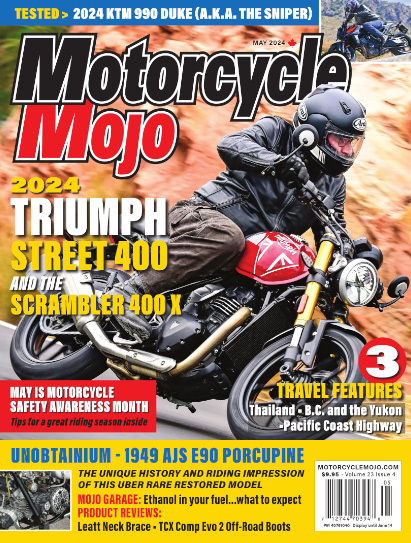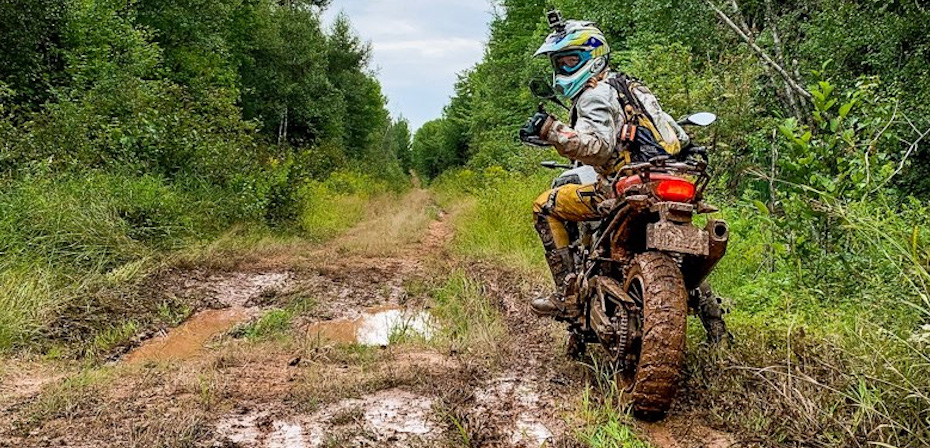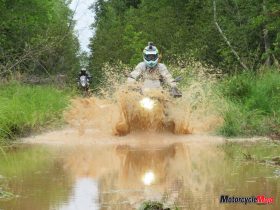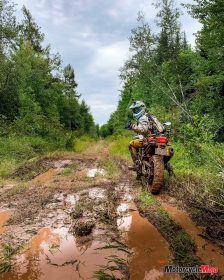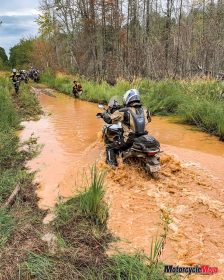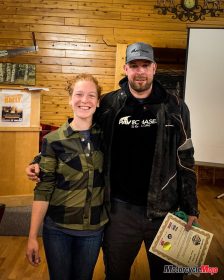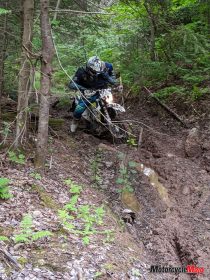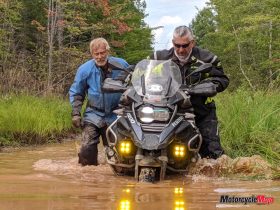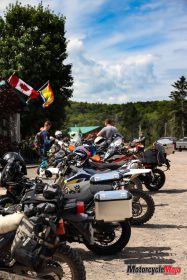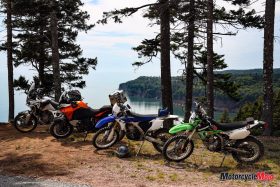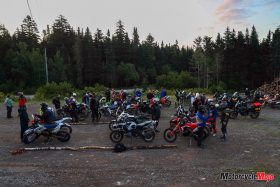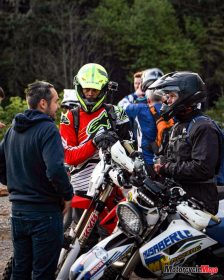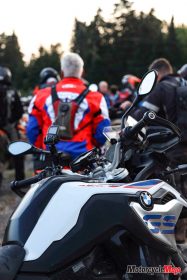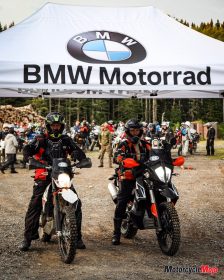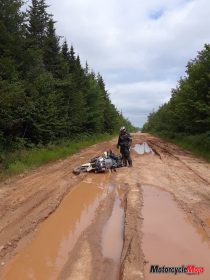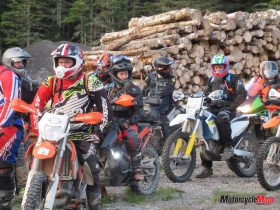There’s no greater satisfaction than completing a challenging off-road rally.
“This is not a race.” Eric Russel’s stern tone rang in my head as I barrelled sideways toward a narrow trail leading across a sunken beaver dam. Shipping pallets and corrugated roofing were placed along the only attainable line – miss that and you’d find yourself waist-deep in fragrant (that is, stinky) mud. My boots had been soaked since the start of the day, so the only enticement to stay on the line was to keep my pride intact.
The Fundy Adventure Rally was established in 2014, when founder Rob Harris of Canada Moto Guide and Canada Moto Rallies wanted to introduce adventure riders to New Brunswick and the intimate Fundy area while challenging their abilities through handpicked routes. Eric and Terri Russel took on the rally in 2016, gaining numbers of riders each year on routes planned to showcase the toughest and most beautiful aspects of the Bay of Fundy area.
In the rally, there are three route options for each of the five legs throughout the approximately 500 km
day.
The A routes are easiest and mostly on pavement; the B routes cover moderate gravel and pavement with challenging sections; and the C routes are the most challenging and mostly on gravel and dirt. Each route is worth a number of points based on technicality and distance. The goal is to gain points by finishing all five legs. However, in order to do so, teams of two to four riders must finish the course or make it to the “bail-out” point before the time cutoff. The bail-out point was at the end of the fourth leg and was put in place to ensure that teams don’t have to ride through the night, thus putting themselves at risk.
The Night Before
I arrived at Adair’s Wilderness Lodge in the backwoods south of Sussex, N.B., knowing no one but quickly feeling right at home as any “Come From Away” person would around Maritimers. Tales of treachery from previous years were shared between friends, most of whom see each other only once a year, at the rally.
I was lucky enough to snag a new F850GS from BMW Canada, a bike that encourages confidence in the rider both on- and off-road. I met Karl Roy, my assigned teammate, who is a local from up the road in Salisbury and who rides a KTM 1190 Adventure S. Unbeknownst to me, Karl had yet to take his KTM off-road. I mentioned to him that I’d like to do B and C routes, as I am comfortable riding on any type of terrain on the 850GS and was unaware of my partner’s mostly street experience with his bike. We were there to have fun, not get hurt. Eric’s voice continued to ring in my head: “This is not a race.”
Off to the Start Gates
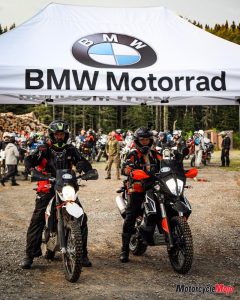 We awoke Saturday to brisk temperatures and lingering fog. I had decided to navigate, as Karl hadn’t used a GPS before. My expertise in using a GPS twice before was expected to help. We pulled into the C route start line with confidence exuding from our pores and our pipes. The timer began, and we took off. Within 10 minutes, I had turned us down the wrong road and we found ourselves backtracking. My extensive GPS experience apparently didn’t help.
We awoke Saturday to brisk temperatures and lingering fog. I had decided to navigate, as Karl hadn’t used a GPS before. My expertise in using a GPS twice before was expected to help. We pulled into the C route start line with confidence exuding from our pores and our pipes. The timer began, and we took off. Within 10 minutes, I had turned us down the wrong road and we found ourselves backtracking. My extensive GPS experience apparently didn’t help.
We found ourselves in the thick of the rally route, riding down logging roads that narrowed into loose ATV trails and crossing rivers that lead to a hill climb that demanded commitment. I roared through the river and onto the steep incline already wet and torn up and rutted from previous bikes. My eyes were looking up, but the bike was not following. I tried steadying the bike with my short legs – something I know better than to do, as this action only left me pinned under the bike when it went from vertical to horizontal. A good reminder of why teams are mandatory.
Karl quickly helped to upright both my bike and me. He held the bike from the rear as I climbed up the loose ground of the hill, instinctively paddling the air above the ground with my feet, the rear tire spitting rocks at him.
We rode into a gas station and found many other riders still there – some with flat tires; others covered in mud and looking as though they were digging trenches. I pulled up beside Charles Landry, one of the fantastic route organizers, and he cheerfully pointed out that we were in last place. We will blame that one on my navigation.
Second Leg (Got Mud?)
We would try another C route for the second leg, it was the shortest route and we thought it might be a good opportunity to make up some time. It wasn’t. We found ourselves riding through wheel-deep ruts filled with clay and strewn with logs. I stopped after a particularly difficult section, noticing Karl was no longer behind me. I found him nearby, standing beside his bike with his head hung low. As I approached, asking if he was all right, he lifted his head to answer no, his words muffled by an obscene amount of blood pouring from his mouth.
I should mention that Karl arrived in the morning wearing a Bell Rogue half-shell helmet with a detachable “muzzle” jaw piece, along with his Harley-Davidson goggles, which offered more style than protection. Both the jaw piece and goggles came off early into the ride, exposing his face even more. We had a good laugh about his choice in the morning, but now we regretted all the jokes we had made. After we confirmed that his pearly whites were all still in attendance, we rode on to the next checkpoint.
Third Leg (Scenery for Days)
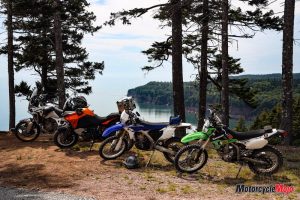 If we thought we were going to make up time, we did the exact opposite. And although this wasn’t a race, we knew we had to ride efficiently if we wanted to finish the fourth leg before the bail-out time, as finishing Leg No. 4 would allow us to ride the fifth leg and complete the rally. The best option was the A route leading us to a mandatory lunch. Taking this option would allow us to make up some real time, calm our nerves and hopefully ensure that we would finish all five legs.
If we thought we were going to make up time, we did the exact opposite. And although this wasn’t a race, we knew we had to ride efficiently if we wanted to finish the fourth leg before the bail-out time, as finishing Leg No. 4 would allow us to ride the fifth leg and complete the rally. The best option was the A route leading us to a mandatory lunch. Taking this option would allow us to make up some real time, calm our nerves and hopefully ensure that we would finish all five legs.
The A route offered some of the best views of the New Brunswick scenery we’d seen so far, with winding, seemingly forgotten paved and gravel roads. This leg of the ride gave us an enjoyable moment to breathe after our morning and to appreciate the work that goes into route planning for the rally – not to mention being immersed in the incredible history and landscape of the Fundy area. Even Karl was impressed by the road choice, given he is from the area and yet discovering roads he didn’t know existed.
We pulled into the Salisbury Big Stop Restaurant and service centre. To our surprise, there were many teams still there. Most were doing some sort of mechanical repair on their bikes or pouring small ponds out of their boots from their previous leg of the rally. Karl’s upper lip was still swollen, although he wasn’t spitting blood anymore. He questioned whether I thought he should go to the hospital. I replied, “No, if it’s still bleeding once we finish the ride, then maybe.” My professional opinion.
Fourth Leg (Watering Holes and Trees)
We had learned our lesson and decided to say no to the C routes. The B route was both more practical and held the promise of good trails with the best chance of reaching the bail-out point on time. Karl noticed that the route went very close to his house, so we stopped there and he grabbed a much more appropriate motocross helmet and goggles.
We rode through puddles lined with slick clay, each one bigger than the previous one. I attempted to skirt around one puddle, but my wheels slid sideways and sent me tumbling into a water-filled ditch. I was definitely wet now.
Before long, we heard voices. Riders had gathered, each helping another to reach dry land on the other side of what looked like a small lake – one that had already flooded a few bikes. Some riders walked their bikes through the waist-deep water, while others rode through with success.
I waded into the puddle up to my belly button, then decided that trying to ride through would be best. The waterhole looked deceitfully simple: I rode my bike slowly as it became submerged before chugging back onto dryer land.
We continued meandering down logging roads, finding solace in the slightly easier skill level required to get through the B route. That is, until we came to a point where multiple trees were down across the road. Arrogantly, and without scouting ahead, I rode up onto a forest cut-block littered with stumps and around the first set of trees, only to see even more trees lying across the road ahead.
Most of the bikes that began the rally were new, shiny and without scars, and the owners were hoping to keep them that way. As teams filed in behind us, we decided as a group that dragging our bikes under the fallen trees or up and around on the loose ground wasn’t worth it, especially so late in the day. We decided to backtrack and link up with the road below the deadfall section to finish the route. My thanks to new friends who helped ensure I wouldn’t drop the scratch-free 850GS while riding back through the log-strewn section.
Did We Actually Make It?
We worked our darnedest to ride to the checkpoint, taking little time to appreciate the views surrounding us as we reached the town of Alma on the Fundy coast. To our surprise, we had made it two minutes before the bail-out time! Originally, we wanted to press on for the C route, but feeling exhausted after the day’s ride so far, we opted for the moderate B route. As we took off on our last leg of the rally, I realized that the A route may have been a smarter choice if we wanted to avoid further injury to the bikes, our pride and Karl’s face.
We ascended a long winding hill filled with shark-finned rocks that threatened our rubber. As we summited the ridge, we witnessed an epic New Brunswick sunset backdrop that reminded us of one of many reasons we chose to put ourselves and our bikes through this abuse. Soon afterward, we passed a fellow rider who was waiting to be picked up; he was well equipped and napping beside his F800GS, wearing a bug net. He was just one of many mechanical breakdowns we saw throughout the day.
Workin’ on Our Night Moves
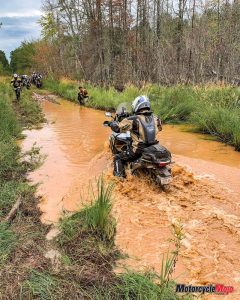 We were racing the diminishing light as we turned onto the Adaire’s Wilderness Lodge road. Our pace quickened as we rode the tarmac up to the lodge, only kilometres away. My Spidey senses tingled; something wasn’t right. I looked down at the GPS and noticed we were now off-track. There couldn’t be more, could there? Oh, the cruel thoughts that must have gone through Eric’s and Charles’ head as they planned this last route.
We were racing the diminishing light as we turned onto the Adaire’s Wilderness Lodge road. Our pace quickened as we rode the tarmac up to the lodge, only kilometres away. My Spidey senses tingled; something wasn’t right. I looked down at the GPS and noticed we were now off-track. There couldn’t be more, could there? Oh, the cruel thoughts that must have gone through Eric’s and Charles’ head as they planned this last route.
Back into the bush once again, through tight trees with off-camber roots and large rocks strategically placed to throw anyone who wasn’t completely focused off their bike. The trees began to get spaced farther apart and we soon found ourselves looking at the silhouette of a large hill with a faint line drawn down it that met up with the trail. I knew momentum was key, so I gassed it as I approached, riding up rounded river-worn rocks that supplied little traction and maximum bounce. I was not going to drop this bike again!
We struggled through the dark technical trail until we finally met up with the section of road we left 45 minutes before, just to complete the tedious section. “This is not a race,” I reminded myself as we pulled into Adaire’s. We were last team to arrive after completing the whole course. Everyone was already drinking and telling tales of breakdowns, injuries and damn good times.
All of us had soaked boots – most after 20 minutes into the ride – with every leg of the rally offering a reminder of the immense amount of water that the Maritimes have to offer. Throughout the day, I asked myself why I had decided to do this.
Aside from the obvious fact of getting to experience some of the most challenging and incredibly beautiful trails and scenery that New Brunswick has to offer, I think that as humans we strive to prove our worth to ourselves, whether subconsciously or purely as ego; that drive pushes us to see how far we can make it in our riding. Oftentimes, that drive leads us to enter rallies where the idea of being cold, wet and there being a good chance you’ll break your bike is enticement enough. Only a strong drink and good conversation could soothe the bruises and scrapes from our day.
All Good Things Must Come To An End
The next day, we assembled for the final breakfast and awards before all of the riders departed. Eric announced each team and their points. Four teams received the highest “bitcoin” status this year. Karl and I walked happily away with our completion certificate, having received “gold” status with the amount of points we had – even though we were slower than snails.
The rally came to a bittersweet close, with Eric and Terri announcing that they will no longer be running the rally that they took on in 2016. Although they will not be organizing the event anymore, there is hope that the rally may once again come to life in the future with the help of some very dedicated volunteers or with the help of a business or buyer for the rally. The Fundy Adventure Rally has brought so many people together from eastern and central North America, and I have high hopes that this event will run once again.
Many tired riders had long rides ahead of them to return home – some from Maine, New Hampshire or any province east of Ontario. All participants left with smiles still plastered on their faces from the previous day’s ride. Some had to trailer their bikes back home after experiencing multiple flats, mechanical issues and roadside oil changes after being flooded in one of the many waterholes; a few participants had minor injuries and there was one broken collarbone. Scrapes and bruises are badges of honour at the Fundy rally, reminding us of the lengths we’re willing to go to for a good time. In the end there is no podium; no medals – just memories ingrained in the minds of the riders.
We learned the Fundy Adventure Rally was not a race. Rather, it is a journey of self, teammates and the motorcycle.
BMW’s F850GS, Revisited
I rode this bike before for only a day during a press launch in Colorado this past October. I was excited to get back on the bike, but also a bit nervous. I knew it would be a big day of riding – and that it was.
I can comfortably say that this was the hardest riding I have ever done on a two-cylinder machine, and I was happy it was the F850GS. While it’s only 20 kg lighter than the R1250GS and the forks are not adjustable, these attributes don’t seem to be a bother while riding. The compact design, a high ground clearance and low seat height creates a nimble and forgiving ride through technical and rough sections.
The biggest hindrance with the bike throughout the day for me was the seat and tank: they are still a bit wide for maintaining an aggressive standing stance for long periods. The seat is a bit thinner than the previous generation (F800GS), but the tank feels wider, so my legs wanted to lock in a standing position, which moved my weight from the balls of my feet to my heels; as a result, I had to grip my bars more than I’d like. This, of course, is very dependent on your height and stature; I think that a taller person may not experience this issue the same way.
The F850GS is very obedient in both fast and slow technical sections. The engine is smooth and responsive and the transmission is well geared for slow, technical riding.
Throughout the day, I became more and more comfortable with the bike. It wanted to remain vertical even when I made mistakes, forgiving while providing more than enough torque to roar into a hill climb or through a water hole.







